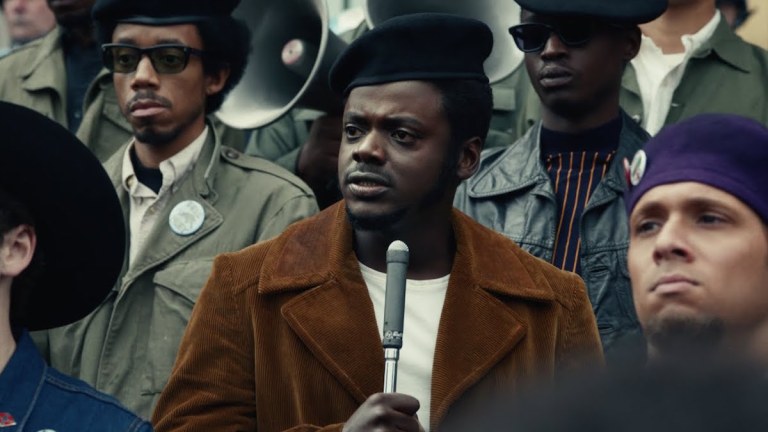Judas and the Black Messiah Review: Lead Cast Stuns in HBO Max Release
Daniel Kaluuya and LaKeith Stanfield do career-defining work in Shaka King’s fiery Judas and the Black Messiah.

One of the most striking things about Judas and the Black Messiah, Shaka King’s new Molotov Cocktail of a film, is how it really isn’t Fred Hampton’s story. The movie is obviously about Hampton, the charismatic Black Panther Party leader who’s given sweltering life here by Daniel Kaluuya in the performance of his career. Yet like the title suggests, the Black Messiah of this narrative is observed from afar—and from the vantage of the man who doomed him.
It’s a familiar tact for stories about greatness cut short, and figures too large for a movie’s runtime to grasp. That’s how Lin-Manuel Miranda accounted for Alexander Hamilton via the envy of Aaron Burr, and why Jesus Christ Superstar told the its parable through the prism of the silver-tongued apostle. But in Judas and the Black Messiah, this narrative technique has never been more uncomfortable or slippery. Walking in the shoes of William O’Neal, the used and abused FBI informant who helped law enforcement eventually execute Hampton, is like spending two hours in an active crime scene where the blood is still fresh, and any semblance of justice remains perpetually out of reach.
As that treacherous figure, LaKeith Stanfield is every bit as good as Kaluuya, albeit in a less flattering role. By calibrating every involuntary tic and strained movement, Stanfield imbues the film with a jittery nervous energy that puts the whole piece on edge. And this holds true even before O’Neal becomes an informant.
In the film’s opening scene, Stanfield is a petty thief with an amusing con: He pretends to be an FBI agent and uses a fake badge to boost cars in the neighborhood. But when the real Federal Bureau of Investigation finds out—as embodied by agent Roy Mitchell (Jesse Plemons)—O’Neal ends up facing something worse than prison time, even if it takes him the whole movie to figure it out.
Impressed by O’Neal’s confidence games, Mitchell coerces the Black man behind the eight-ball into infiltrating the Illinois chapter of the Black Panther Party as part of COINTELPRO, a covert and illegal operation to spy on and sabotage political groups that FBI Director J. Edgar Hoover (a broad Martin Sheen) deems radical. Hoover is particularly obsessed with Kaluuya’s Hampton, a revolutionary socialist who was in the process of building the Rainbow Coalition—which matched the Black Power zeal of the Panthers with groups like Appalachian-based, all-white Young Patriots.
Hampton could make harmony out of dissonance. Hence why Hoover dubbed him “the Black Messiah,” and how O’Neal ends up escorting him to the cross.
As purely an exercise in aesthetics, Judas and the Black Messiah is a stunning revelation for King, who’s previous work mostly consisted of sitcoms like People of Earth and Shrill. Working from a screenplay he wrote with Will Berson (and a story by comedy writers Keith and Kenneth Lucas), King shows a canny eye for the type of hard edged bombast that street level dramas reveled in during previous decades.
There are shades of classic crime movies in the brutal efficiency of Judas’ paranoid storytelling and editing, except that the film’s crooked element is the law enforcement trying to manipulate Hampton and the movement. There’s a queasiness to a narrative about characters fighting for political mobilization getting perverted by the presence of the film’s protagonist. Every scene is permeated with dread, but only O’Neal can seemingly hear someone smashing a minor key on the soundtrack.
With such blunt force stylization, the movie doesn’t just succeed at making the obvious parallels to today feel potent; Judas and the Black Messiah transforms a period traditionally treated as a moment of “civil” strife into a full-fledged warzone, and the police are the occupying force.
In its best moments, the approach is kinetic, particularly when Hampton picks up a microphone. Kaluuya is absolutely riveting whenever he’s on the stump, drawing out a lingering Louisianian twang from an upbringing Hampton couldn’t quite shake. And neither the actor nor his director appear concerned about explaining every aspect of Hampton’s political maneuvering, or even articulating it. This is a performance intent on fanning the flames of passion through the screen.
Kaluuya’s fervor blended with Stanfield’s anxiety makes a potent combination. It’s also on the pair to overcome some of the film’s pitfalls in the back half. While chronicling the last years of Hampton’s life, including his assassination at the hands of police, from the point-of-view of the only man who saw it coming is an intriguing conceit, it fails to ever let O’Neal be particularly sympathetic. Stanfield balances the part at a perfect keel and certainly makes for a pitiful figure. Yet when the film damns him from the first reel, then the distance between viewers and Hampton becomes too vast by the end.
There are concessions and fleeting glimpses into Hampton’s home life, as his romance with Deborah Johnson (Dominique Fishback) is given a delicate nod. But even in those scenes, Hampton appears vaguely like a statue, standing above the film and his life. Also beyond Plemons’ buttoned up square with the sharpest of edges, the other supporting characters are largely underdeveloped, with pivotal events occurring in the BPP’s late ‘60s struggles lacking clarity.
These shortcomings somewhat drag the third act before the tragedy becomes total, but they’re also minor stumbles in a vivid and persuasive piece of filmmaking. King and company know too well the urgency of their story, and how its depiction of American history reminds us that the past never fully passes. But in Judas and the Black Messiah it can still bring you to tears, and give a mic to a voice silenced for much too long.
Judas and the Black Messiah opens in theaters and premieres on HBO Max on Feb. 12.
